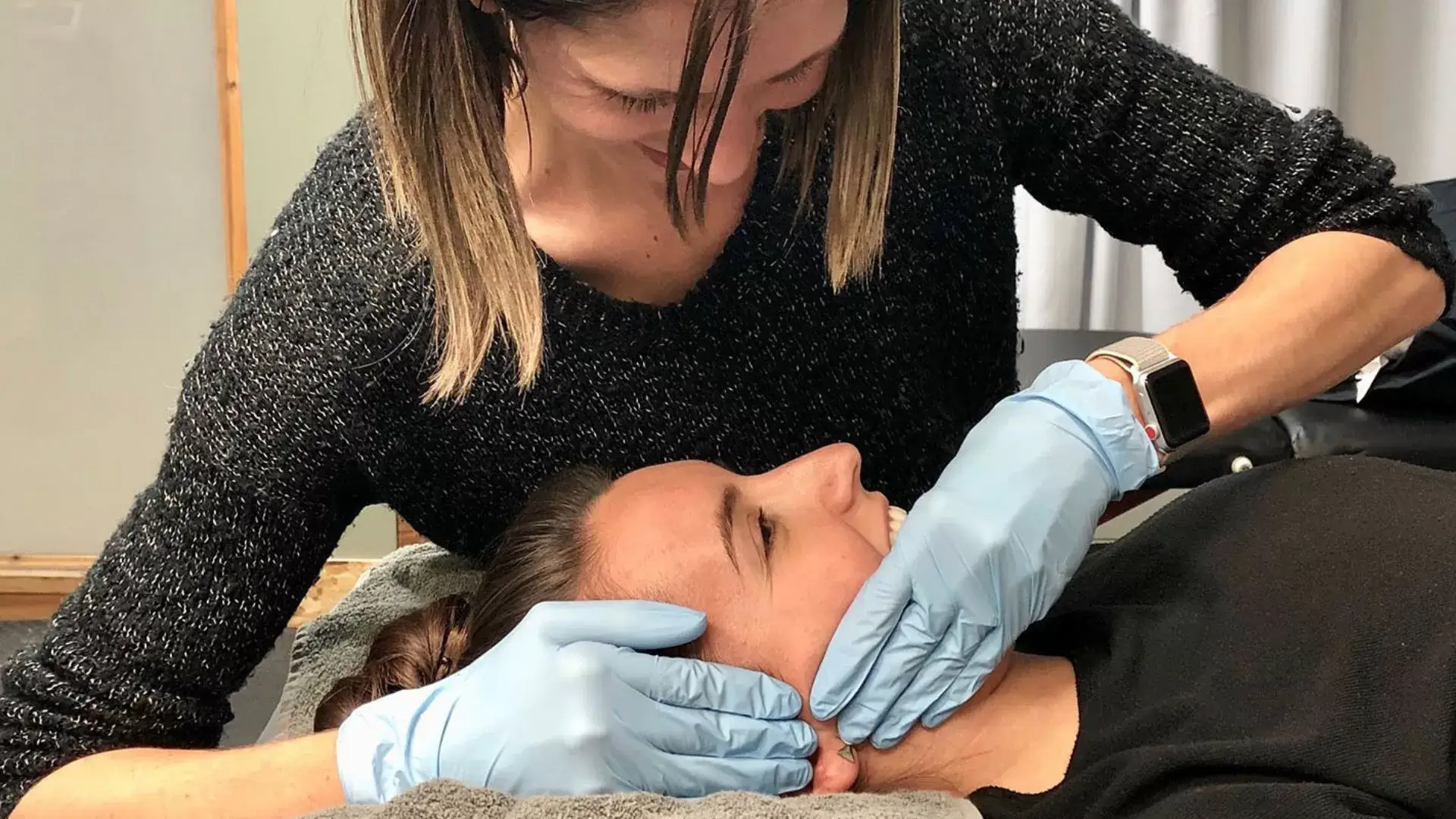Our Top Physiotherapy & Chiropractic Clinic in Mississauga, we recognize the discomfort TMJ disorders can cause. We offer specialized Physiotherapy for TMJ tailored to alleviate symptoms like jaw pain, headaches, and muscle tension. Our compassionate approach includes techniques such as manual therapy, jaw exercises, and postural correction. We collaborate closely with our patients to develop individualized treatment plans that promote healing and improve jaw function. Additionally, we incorporate complementary therapies like heat and ice, or ultrasound therapy, to enhance comfort and recovery. By exploring our services, you’ll discover how we can help you manage TMJ effectively.

At Mississauga Physio Chiro Clinic, we offer thorough physiotherapy and chiropractic services tailored to address the unique needs of each patient, ensuring effective relief from TMJ discomfort and related issues. Our focus is on treating TMJ disorders, specifically temporomandibular joint dysfunction, which often manifests as jaw pain, stiffness, and discomfort.
We understand that many patients experience bruxism, leading to further complications like jaw stiffness and pain. Our team employs a combination of physical therapy and manual therapy techniques designed to alleviate these symptoms. We prioritize pain management strategies that not only target immediate discomfort but also promote long-term wellness and functionality.
During your assessment, we’ll work together to develop a personalized treatment plan, incorporating exercises and therapies aimed at improving jaw mobility and reducing tension. Our goal is to empower you with knowledge and tools to manage your TMJ treatment effectively.
Understanding TMJ disorders is essential, as they can greatly impair jaw function and lead to discomfort in daily activities such as eating, speaking, and even breathing. The temporomandibular joint (TMJ) connects our jaw to the skull, and when it’s not functioning properly, we may experience jaw dysfunction. Symptoms often include jaw clicking, jaw popping, and significant facial pain.
Many of us might not realize that habits such as teeth grinding and clenching can exacerbate temporomandibular dysfunction. Over time, these actions can lead to malocclusion, further complicating our ability to use our jaws effectively. This dysfunction doesn’t just affect physical function; it can also create emotional distress, impacting our quality of life.
In recognizing these effects, we can better understand the importance of seeking treatment. Physiotherapy can help alleviate symptoms, improve jaw mobility, and restore function. By addressing the root causes of TMJ disorders, we can work towards effective management strategies, allowing us to enjoy our daily activities without discomfort. Being informed about how TMJ disorders affect us empowers us to seek the help we need.
Identifying common causes and risk factors of TMJ dysfunction is essential for effectively managing this condition and preventing its progression. One significant factor is muscle tension, often exacerbated by stress. As we navigate our daily lives, stress management techniques can play a vital role in alleviating this tension and reducing the likelihood of developing temporomandibular joint syndrome.
Jaw misalignment is another important contributor, as it can lead to TMJ inflammation and chewing difficulty. In some cases, TMJ arthritis can further complicate these issues, causing pain and discomfort. Facial asymmetry may also arise from prolonged muscle tension, leading to imbalances that affect jaw function.
We should also consider the impact of postural correction; poor posture can strain the jaw muscles and create additional stress on the temporomandibular joint. Neuromuscular dentistry can provide insights into how our dental health influences TMJ dysfunction, helping us address underlying issues effectively. By understanding these causes and risk factors, we can better equip ourselves to manage TMJ dysfunction and enhance our overall well-being.
TMJ disorders can manifest through a variety of symptoms that often impact our daily lives, making it essential for us to recognize these signs early on. Many of us experience orofacial pain, which can range from mild discomfort to severe pain that affects our ability to eat or speak. We might notice jaw locking or joint instability, making it difficult to open or close our mouths comfortably.
Other common symptoms include bite misalignment that can lead to further issues if left unaddressed. Headaches and ear pain are frequently reported, often stemming from the strain placed on the muscles around the jaw. In some cases, we may even encounter speech problems due to the discomfort while articulating words.
TMJ disc displacement can also play a role in the severity of our symptoms, contributing to craniofacial pain that can be debilitating. Utilizing TMJ imaging can help us and our healthcare providers better understand the underlying issues we face. By identifying these symptoms early, we can take proactive steps towards improving our quality of life and managing the effects of TMJ disorders effectively.

Physiotherapy often plays an essential role in alleviating the discomfort associated with TMJ disorders, helping us regain function and improve our overall well-being. By targeting the masticatory muscles, we can effectively reduce pain and improve jaw mobility. Our treatment plan may include the use of a TMJ splint to stabilize the joint and relieve pressure during daily activities.
We utilize various techniques such as myofascial release and trigger point therapy to address muscle tension and discomfort. Joint mobilization can also enhance movement and flexibility, allowing us to regain normal function. Additionally, we may incorporate heat therapy and ice therapy to further manage inflammation and pain.
Ultrasound therapy is another valuable tool in our physiotherapy arsenal, promoting tissue healing and reducing discomfort. In some cases, we might recommend NSAIDs to complement our treatment strategies. Overall, our focus on TMJ rehabilitation aims to restore balance and function, empowering us to live with less pain and greater ease. Through a compassionate and tailored approach, we can effectively support one another on the journey toward recovery.
Through the application of manual therapy and myofascial techniques, we can effectively address the muscle tension and joint restrictions often associated with TMJ disorders. These techniques are designed to relieve pain and improve function by targeting the specific muscles around the jaw, neck, and face.
In our practice, we frequently observe that patients experience neck pain and jaw swelling due to the stress placed on these areas. By employing manual therapy, we can help reduce muscle tightness and promote relaxation, which is essential in alleviating TMJ-related discomfort. Myofascial techniques further enhance this process by releasing trigger points that may contribute to facial nerve pain and joint degeneration.
Additionally, we emphasize the importance of complementing these therapies with anti-inflammatory treatments and, when necessary, muscle relaxants. This holistic approach helps us achieve ideal TMJ relief and restores our patients’ quality of life.
Ultimately, our goal is to empower individuals to manage their TMJ symptoms effectively through personalized physiotherapy interventions, leading to improved function and reduced discomfort. By focusing on manual therapy and myofascial techniques, we can make significant strides in the treatment of TMJ disorders.
Maintaining proper postural alignment is essential for effective rehabilitation of jaw-related issues, as it directly influences the mechanics of the temporomandibular joint and surrounding muscles. When we adopt a poor posture, we can inadvertently contribute to conditions like TMJ dislocation and disc displacement without reduction, exacerbating symptoms and complicating recovery.
Through postural correction, we can alleviate stress on the temporomandibular joint, potentially reducing the need for more invasive options like TMJ surgery. This approach often complements therapies such as occlusal splints and bite guards, which help manage the alignment of the jaw. Additionally, integrating chiropractic care and oral appliance therapy can enhance our overall treatment plan, addressing underlying issues related to degenerative joint disease and headache disorders.
Incorporating jaw strengthening and stretching exercises into our routine can considerably alleviate TMJ pain and enhance overall jaw function. These exercises target the masseter muscle and promote better coordination of the trigeminal nerve, which plays a significant role in jaw movement. By focusing on specific jaw strengthening exercises, we can improve the stability of our jaw, reducing the risk of TMJ subluxation and providing effective TMJ pain relief.
Stretching exercises complement strengthening routines by promoting flexibility and reducing tension around the jaw. This is particularly important for those experiencing conditions like disc displacement with reduction, where proper jaw mechanics are essential. For those using a dental splint or night guard, these exercises can be beneficial, especially when combined with physiotherapy sessions tailored to our unique needs.
It’s essential to start slowly and gradually increase the intensity of these exercises, ensuring we listen to our bodies throughout the process. By committing to regular jaw strengthening and stretching exercises, we can foster long-term relief from TMJ pain and enhance our overall jaw function, leading to improved quality of life.

While strengthening and stretching exercises are essential for TMJ relief, managing stress and incorporating relaxation techniques can greatly further reduce jaw tension and improve our overall well-being. In our physiotherapy journey, we often overlook the impact of stress on TMJ symptoms. By focusing on stress reduction, we can enhance pain management and achieve better tension relief.
Mindfulness practices, such as meditation and deep breathing, play an important role in managing TMJ discomfort. These relaxation techniques help us become aware of our body’s tension, allowing us to consciously release it. Integrating deep breathing exercises into our daily routine can markedly lower stress levels, making it easier to perform our jaw exercises without the burden of anxiety.
Additionally, using therapeutic modalities like guided imagery or progressive muscle relaxation can offer profound benefits. As we prioritize our mental well-being, we create a supportive environment for physical healing. Ultimately, by combining stress reduction strategies with our physiotherapy regimen, we foster a holistic approach to TMJ management, leading to improved quality of life and reduced pain. Together, let’s embrace these techniques for a healthier, more relaxed jaw.
Utilizing heat and ice therapy can considerably alleviate TMJ pain and inflammation, providing us with effective tools for managing discomfort. In our physiotherapy sessions, we often recommend these therapy techniques to help reduce tension in the jaw and promote pain relief.
Heat therapy works by increasing blood flow to the affected area, which can help relax tight muscles and ease stiffness. Applying a warm compress or heating pad for 15-20 minutes can be particularly beneficial before engaging in exercises or stretches, as it prepares the muscles for movement.
On the other hand, ice therapy is invaluable for reducing inflammation and numbing sharp pain. We can apply an ice pack wrapped in a cloth to the jaw for about 10-15 minutes, especially after any activity that might exacerbate TMJ symptoms. This combination of heat and ice therapy not only addresses immediate discomfort but also contributes to our overall treatment plan.
Incorporating these methods into our daily routine can considerably improve our quality of life, allowing us to engage in activities without the constant burden of TMJ pain. Together, let’s explore these effective therapies for our TMJ management.
TENS and ultrasound therapy offer promising avenues for managing TMJ pain, providing us with non-invasive options to enhance our treatment experience. As we navigate the complexities of TMJ disorders, or TMD, these therapies can serve as effective adjuncts to our physiotherapy regimen.
TENS therapy involves delivering low-voltage electrical currents to alleviate pain. This method can be particularly beneficial for patients experiencing TMJ pain relief, as it helps disrupt pain signals sent to the brain. Additionally, ultrasound therapy utilizes sound waves to improve circulation and tissue healing, making it an excellent choice for addressing inflammation often associated with conditions like condylar resorption.
Both therapies can be integrated with other treatment options, such as corticosteroid injections, orthotics, or even Botox for TMJ, to enhance overall outcomes. While an MRI for TMJ may be necessary to evaluate the underlying issues, incorporating TENS and ultrasound therapy into our treatment plan can provide significant benefits. Together, we can explore these innovative therapies, ensuring a holistic approach to managing TMJ pain and improving our quality of life.
Assistive devices and oral appliances frequently play an essential role in the effective management of TMJ disorders, helping to alleviate pain and improve jaw function. These tools, often recommended by dental professionals, can greatly enhance our treatment strategy. For instance, splints and night guards help to reposition the jaw, reduce bruxism, and minimize strain on the TMJ, ultimately easing symptoms like tinnitus.
At our facility located at 1834 Lakeshore Rd W #6C, Mississauga, ON L5J 1J7, we collaborate with specialists in orthodontics and prosthodontics to guarantee a thorough approach to TMJ treatment. We recognize that each patient’s needs are unique, and these devices are customized to provide the best possible support. By addressing the underlying issues contributing to TMJ pain, we can improve our overall treatment outcomes.
If you’re struggling with TMJ symptoms, including persistent pain or discomfort, don’t hesitate to contact us. Our compassionate team is here to guide you through your treatment options, guaranteeing a tailored approach that prioritizes your comfort and well-being. Together, we can work towards restoring your quality of life.
Combining chiropractic care with physiotherapy can greatly enhance our approach to relieving TMJ discomfort and restoring ideal jaw function. When we integrate these two disciplines, we create a holistic treatment plan that addresses both the musculoskeletal and functional aspects of TMJ disorders.
Chiropractic care focuses on spinal and jaw alignment, which can notably influence how the jaw functions. By ensuring the spine is properly aligned, we can reduce tension in the surrounding muscles, promoting better jaw movement. Physiotherapy, on the other hand, emphasizes exercises and manual therapies that strengthen the muscles around the jaw, improve range of motion, and alleviate pain.
Together, these therapies help us address the root causes of TMJ issues rather than just treating the symptoms. We can tailor our approach to each individual’s needs, using chiropractic adjustments to facilitate proper alignment while employing physiotherapy techniques to enhance muscle strength and flexibility.
Ultimately, this combined approach fosters a more thorough recovery process, encouraging long-term relief from TMJ discomfort. By working collaboratively, we can empower our patients to regain control over their jaw function and improve their overall quality of life.
While our integrated approach of chiropractic and physiotherapy offers significant relief for TMJ disorders, it’s important to explore the full range of treatment options available, including both non-surgical methods and surgical interventions. Non-surgical approaches often serve as the first line of treatment. These may include physical therapy, which focuses on exercises to strengthen jaw muscles, reduce tension, and improve range of motion. We might also consider the use of splints or night guards to prevent teeth grinding and jaw clenching, which can exacerbate TMJ symptoms.
In some cases, we might recommend medications such as anti-inflammatories or muscle relaxants to alleviate pain and swelling. For those who don’t respond to these conservative measures, surgical options may be discussed. Surgery is generally reserved for severe cases, such as structural issues within the joint, that haven’t improved with non-surgical treatments. It’s essential that we weigh the potential benefits and risks of surgery carefully, as it can involve longer recovery times and complications. Ultimately, our goal is to tailor a treatment plan that best addresses each individual’s needs, while prioritizing their comfort and well-being throughout the process.
Implementing long-term management strategies can considerably reduce the frequency and intensity of TMJ symptoms, allowing us to maintain better jaw health and overall comfort. One effective approach is to incorporate regular stretching and strengthening exercises into our daily routine. These exercises can help improve jaw mobility and reduce muscle tension, which are essential for managing TMJ discomfort.
Additionally, we should pay close attention to our posture. Maintaining proper alignment while sitting and standing can alleviate unnecessary strain on the jaw and neck muscles. It’s also beneficial to practice relaxation techniques, such as deep breathing or mindfulness, to reduce stress, which often contributes to TMJ symptoms.
We shouldn’t underestimate the role of a balanced diet. Avoiding hard, chewy foods can help minimize strain on our jaw while ensuring we maintain proper nutrition. Furthermore, using heat or cold therapy can provide relief when symptoms flare up.
Lastly, staying hydrated is critical for our overall health, including joint function. By adopting these strategies, we can create a supportive environment for our jaw, ultimately leading to improved comfort and reduced TMJ symptoms in our daily lives.
Seeking expert physiotherapy for TMJ disorders in Mississauga can greatly enhance our understanding and management of this condition, leading to better outcomes and improved quality of life. When we encounter TMJ issues, it’s essential to work with professionals who specialize in this area. They can provide tailored treatment plans that address our unique symptoms and needs.
Physiotherapists are equipped with the knowledge and skills to assess our specific situations thoroughly. They’ll use evidence-based techniques to alleviate pain, improve jaw function, and educate us on proper posture and relaxation exercises. By collaborating with these experts, we can also learn valuable self-management strategies that can notably reduce the frequency and intensity of our symptoms.
Moreover, reaching out for physiotherapy allows us to engage in a supportive environment where our concerns are heard and validated. This compassionate approach not only fosters a sense of community but also empowers us to take active steps towards recovery. If we’re struggling with TMJ disorders, don’t hesitate to connect with a physiotherapy clinic in Mississauga. Together, we can work towards a pain-free and healthier future.
Mississauga, a vibrant city in Ontario, boasts a rich cultural diversity and a strong sense of community that enhances our quality of life. As one of Canada’s largest cities, we’re proud of our dynamic neighborhoods, each contributing unique flavors and experiences to the fabric of our community. From diverse dining options to cultural festivals, there’s always something to celebrate.
Our strategic location, just west of Toronto, makes Mississauga a hub for business and innovation. We’ve become home to numerous multinational corporations, providing residents with ample employment opportunities. Furthermore, our extensive public transportation system connects us seamlessly to the Greater Toronto Area, making commuting convenient for everyone.
In addition to our thriving economy, Mississauga is enriched by beautiful parks, recreational facilities, and community programs aimed at fostering health and wellness. This commitment to public health is essential, especially for those of us dealing with health issues like TMJ disorders.
As we support each other in accessing healthcare services, including physiotherapy, we strengthen our community bonds. Together, we can navigate our health journeys with compassion and understanding, ensuring a better quality of life for all residents.

When it comes to physiotherapy sessions, they typically last between 30 to 60 minutes. We usually spend this time evaluating our needs, discussing our symptoms, and engaging in targeted exercises. It’s important to remember that each session is tailored to our individual progress and comfort levels. With consistent attendance, we can expect to see improvements over time, making each session a valuable step towards our recovery and well-being.
When it comes to physiotherapy, we’re often concerned about potential side effects. While most people experience benefits, some might notice mild discomfort or soreness after sessions. These reactions typically subside quickly and are considered normal as our bodies adjust. It’s essential for us to communicate any concerns with our physiotherapist, ensuring a tailored approach that prioritizes our comfort and well-being throughout the treatment process. Overall, the benefits usually outweigh these temporary side effects.
Yes, children can experience TMJ disorders that may require physiotherapy. These issues can arise from various factors, like misalignment, trauma, or stress. It’s essential for us to recognize the signs, such as jaw pain or difficulty chewing, and seek appropriate care. Early intervention can help manage symptoms and prevent further complications. We should always consult with healthcare professionals to guarantee our children receive the best possible treatment tailored to their needs.
When it comes to finding relief from TMJ disorders, the number of physiotherapy sessions we might need can vary. Typically, we might expect to attend anywhere from 4 to 12 sessions, depending on the severity of our symptoms and our individual response to treatment. Regular assessments will help our physiotherapist tailor the program to our needs, ensuring we’re on the right track toward alleviating discomfort and improving jaw function effectively.
When it comes to insurance coverage for physiotherapy treatments, we should check our individual plans. Many insurance providers do cover physiotherapy, but the extent can vary. It’s crucial for us to review our policy details or contact our insurance company directly to understand what’s included. If we’ve got a referral from a healthcare professional, it might increase our chances of coverage. Let’s guarantee we’re informed to make the best decision for our health.
Reach out to us today to book an appointment or learn more about our services. Our friendly team is here to answer your questions and help you take the first step toward improved health and wellness.
(647) 372-1209

At our Mississauga Physio Chiro Clinic, we are dedicated to providing personalized care that addresses the root cause of your discomfort. With a team of experienced physiotherapists and chiropractors, we focus on restoring your mobility, relieving pain, and enhancing your overall well-being.